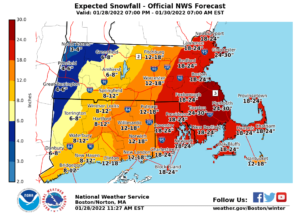Parking Ban in Effect 6 p.m. Friday to 6 p.m. Monday
RANDOLPH — Chief Anthony Marag and the Randolph Police Department would like to share the following Parking Ban information and safety precautions ahead of this weekend’s major winter storm.
A Parking Ban has been issued for the Town of Randolph. Beginning at 6 p.m. Friday, Jan. 28 until 6 p.m. Monday, Jan. 31, there will be no parking allowed on any public way, sidewalk or town property adjacent to a public way or sidewalk. Any vehicle in violation of the Parking Ban will be subject to a ticket and will be towed for interfering with snow removal.
Residents should plan to stay off the roads and stay indoors, if possible, for much of the weekend. Travel will likely be hazardous and plow and sand/salt trucks will need time and space to operate.
At this time, the National Weather Service (NWS) has issued a Blizzard Warning for much of eastern Massachusetts beginning at midnight, Saturday, Jan. 29. The NWS issues Blizzard Warnings for expected frequent wind gusts greater than or equal to 35 mph accompanied by falling and/or blowing snow, which frequently reduces visibility to less than 1/4 mile for three hours or more. The warning indicates that whiteout conditions are possible and people should not travel.
The most recent forecast indicates that snow accumulations of 15 to 19 inches are possible, with wind gusts as high as 60 miles per hour. Travel conditions are expected to be extremely difficult to impossible. Considerable blowing and drifting snow along with near whiteout conditions are possible at times, and strong winds could cause tree and property damage or power outages in some areas.
Residents are reminded that the forecast can change quickly and at any point and are urged to closely monitor the local forecast throughout the weekend.
Considerations Ahead of a Winter Storm
- Keep your vehicle’s gas tank full so you can leave right away in an emergency and to prevent the fuel line from freezing.
- Keep handy a warm coat, gloves or mittens, hat, water-resistant boots, and extra blankets and warm clothing for each member of the household.
- Check your emergency kit and replenish any items missing or in short supply, especially medications and medical supplies. Keep it nearby.
- Prepare for possible power outages.
- Be sure you have ample heating fuel. If you have alternative heating sources, such as fireplaces, wood- or coal-burning stoves, or space heaters, be sure they are clean and in working order. Review generator safety and never run a generator in an enclosed space.
- Make sure your carbon monoxide detector is working correctly and that the outside vent is clear of leaves and debris. During or after the storm, make sure it is cleared of snow.
Precautions for During a Winter Storm
- Stay indoors and wear warm clothes. Layers of loose-fitting, lightweight, warm clothing will keep you warmer than a bulky sweater. If you feel too warm, remove layers to avoid sweating; if you feel chilled, add layers.
- Bring your companion animals inside before the storm begins. Move other animals to sheltered areas with a supply of non-frozen water.
- Check on relatives, neighbors, and friends, particularly if they are elderly or if they live alone.
- If you must drive during winter weather conditions, make sure all fluid levels are full and ensure that the lights, heater and windshield wipers are in proper working condition.
- Don’t leave the house without the following: A fully charged cellphone, car charger and an emergency supplies kit in your car. Ensure your kit includes additional layers of clothing and non-perishable food.
- If your car gets stuck during a storm, stay in the vehicle. If you leave your vehicle, you will become disoriented quickly in wind-driven snow and cold.
Precautions for After a Winter Storm
- Stay informed by receiving alerts, warnings and public safety information and pay attention to the information provided by local authorities. Residents can also listen to local area radio, NOAA Radio or TV stations for the latest information and updates.
- Stay off the roads and stay indoors, if possible. Give plow and sand/salt trucks the space they need to operate.
- Remain cautious even once conditions have improved. Even if roadways have been cleared of snow following a storm, any water left on the roadways may freeze, resulting in a clear sheet of ice, also known as black ice. Black ice is patchy ice on roadways that cannot easily be seen.
- Assist firefighters by clearing snow away from fire hydrants during and after the storm. Snow should be cleared 3-5 feet all around the hydrant so firefighters have enough room to connect a hose.
For additional winter storm safety information, visit NWS or the Red Cross. For any other questions on cold weather safety please visit weather.gov.
###

